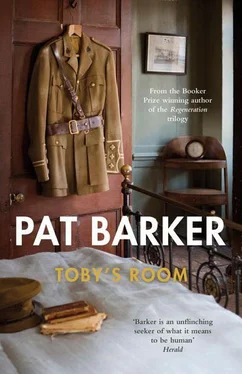At last they reached Ward One. Nurse Wilson shouldered the door open and a blast of institutional smells met them: carbolic, custard, disinfectant, sweaty socks. Toby’s school used to smell like that. A sister met them at the door and pointed to a bed at the far end. It looked miles away. By the time they got there Elinor was gasping for breath. She attempted to steer the grunting man towards the bed, but Nurse Wilson seemed to be pulling the other way.
‘Chair,’ she said. ‘They’re not supposed to lie on —’
‘Oh, bugger that.’
Elinor caught a startled glance, but Nurse Wilson was too well trained — too resigned to being bullied — to argue. They heaved him into a sitting position on the bed. He sat there, swaying, for a long moment and then slowly toppled over on to his side. It was easy, then, to lift his legs, straighten them out and pull a pillow down under his head. The bandages were now a sodden mass of red and black. The face above them, the eyes especially, looked vaguely surprised, as if he couldn’t believe what was happening to him.
‘Right then,’ Elinor said. ‘I’ve got to go.’ She touched the man’s arm. ‘You’ll be all right now, they’ll look after you.’
His head turned in her direction, but he gave no other sign of having heard.
Tonks was waiting outside his room, carrying a bundle of files under one arm.
‘I’m so sorry, Professor Tonks. I got a bit caught up with the new arrivals.’
‘That’s the third big intake this week, God knows what’s going on out there. Oh, and by the way, it’s Harry.’
Harry? ‘Henry’ she might just about have managed, but ‘Harry’? Harry was five stones overweight and sporting a codpiece.
‘Harry,’ she said.
They set off to walk to the huts.
‘I didn’t realize how big it was,’ she said. ‘You don’t get much of an idea from the front.’
‘There’ll be a thousand beds when it’s finished. We’re not far off that now.’
So: a thousand young men with gouged-out eyes, blown-off jaws, gaping holes where their noses had been, crammed in here to be patched up and sent on their way with whatever the surgeons had managed to supply in the way of a face.
Tonks opened the door to the third hut along. ‘Well then,’ he said, in a chirpy medical tone she didn’t recognize. ‘Shall we get started?’
A nurse was feeding the first patient on the list. She stood up when she saw Tonks.
‘No, you go on. We’re a bit early anyway.’
She was holding a tube linked to a small duck-head-shaped container into which she spooned some gloopy greyish stuff: gruel or thin porridge. As she raised the duck-head there was a gurgling sound, then choking, a lot of dabbing and wiping. An awful lot of it seemed to be coming back up.
While they waited, Elinor made herself look round the hut. This was the post-operative ward and many of the men were asleep. The few who were awake looked at her and then quickly away. She turned her attention back to the bed where the nurse was now clearing away the feeding apparatus. As soon as she’d gone, Tonks pulled the curtains further open and bent over the patient, whose face was now in full light. Very gently, Tonks began to ask him questions, more to establish a connection, Elinor thought, than because the answers were relevant to the task in hand. How had he got this? Couldn’t remember, it was all a bit of a blur. As he spoke, you could see his tongue through the hole in his cheek, muscular and hideously long, threshing up and down as he struggled to form the words.
Tonks started to draw. Elinor forced herself to keep looking from the face to the drawing and back again, but she found meeting the man’s left eye difficult, not because it was damaged but because it was intact and full of fear. This was a complete waste of time: she already knew she couldn’t do it. Confronted by this mess of torn muscle and splintered bone, nothing she’d learned about anatomy, whether at the Slade or in the Dissecting Room, was the slightest use. ‘Drawing,’ as Professor Tonks never tired of telling his students, ‘is an explication of the form.’ Well, you can’t explicate what you don’t understand.
The next one wasn’t so bad. He had been a remarkably handsome man; still was, on one side of his face. If anything, his injuries threw the beauty of his remaining features into sharper relief. He reminded her of some of the ‘fragments’ they used to draw at the Slade where so often a chipped nose or broken lip seemed to give the face a poignancy that the undamaged original might have lacked. It disturbed her, this aesthetic response to wounds that should have inspired nothing but pity.
‘It’s worrying, isn’t it?’ Tonks said. ‘When it makes them more beautiful.’
She was surprised he’d detected her uneasiness, particularly since it had been partly sexual. Sex was inescapable here. All the patients were young, some hardly more than boys. You knew, just looking at them, that they lay awake at night wondering what their chances of getting a girl were, now, in their altered state. Tonks, they trusted. He was gentle with them, fatherly, all the things Tonks was never given any credit for being. They didn’t trust her: she was dangerous.
By mid-morning, she was exhausted. Tonks took her back to his room and started to explain the filing system. Some of the patients’ files were almost book length. It wasn’t unusual, Tonks said, for the number of operations to reach double figures. Twenty, thirty sometimes.
‘A life sentence,’ she said.
‘Well, not quite.’
‘You know, there were times in there when I–I just couldn’t understand what I was looking at.’
‘I can help you with that.’ He waited for a reply. ‘I wasn’t disappointed, you know. Not in the least. In fact, I think you did remarkably well.’
‘My drawings were rubbish.’
‘There’s some room for improvement, but they certainly weren’t rubbish.’
Praise from Tonks was so rare she felt a gush of schoolgirlish pleasure. Only later, walking down the main corridor, did she realize how bizarrely inappropriate that response was. Drawing, here, was not about self-expression; there was no room for vanity. No room for individual style, even. But no, that wasn’t quite true. However subordinated to the surgeons’ need for precision and accuracy Tonks’s drawings might be, they were nevertheless unmistakably his.
She felt exposed walking down the corridor alone. It was a relief to reach the dining room where a pot of weak tea and two slices of bread and jam did something to revive her, though chewing and swallowing seemed to have become hard work, as if she too lacked the basic equipment for the task.
Two nurses were talking at the next table: pink-faced, excited, bursting into giggles — it was something about a party they’d been to last weekend. The banging and clattering of pans in the kitchen cut off more than half the words, but she was fascinated by their faces and, above all, their eyes, the way the speaker glanced at her friend, checking she had her full attention, and then effortlessly, unselfconsciously looked away. The listener looked at her friend more directly and for longer periods, now and then she made interested noises, but it was mainly that steady gaze that said: Yes, go on. Then it was the other girl’s turn to speak and the complex pas de deux of glances began again, but with the roles reversed.
That was what you forgot on the wards: how to look at people. To begin with, Elinor had made the mistake of gazing at the patients almost unblinkingly, afraid that any turning away might be interpreted as revulsion. But nobody stares at another person like that: it’s a threat. And so she’d tried to work out a more natural way of looking. No movement of the eyes was innocent here. Watching the two nurses, she realized how fatuous the attempt had been. Even if you worked out exactly what those girls were doing it wouldn’t help you in the least, because the interplay of glances had to be spontaneous, and on these wards you left spontaneity behind you at the door.
Читать дальше












